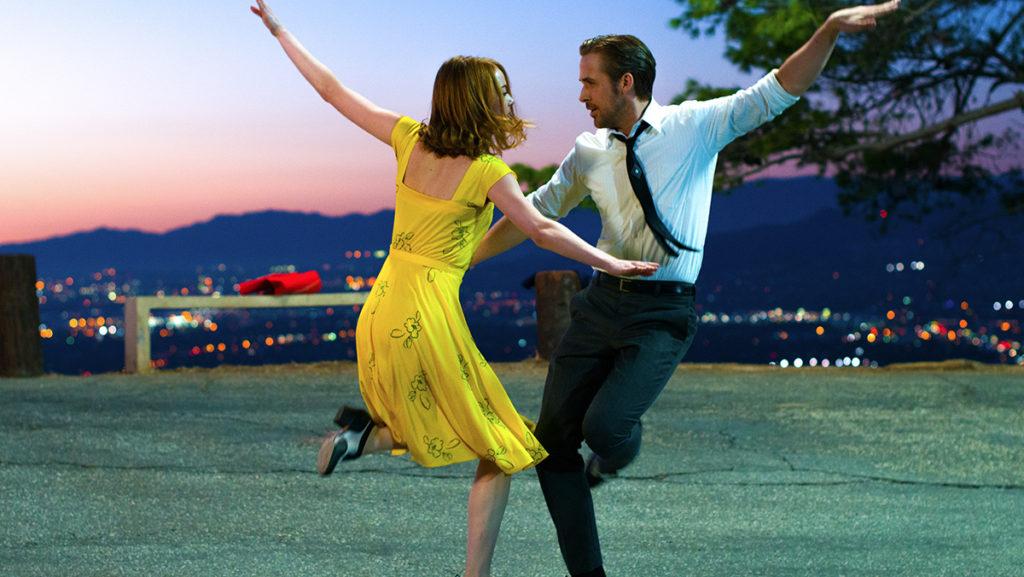With a gorgeous, old Hollywood look and a sweeping story to match, “La La Land” is one of this season’s most buzzed-about cinematic offerings. Damien Chazelle wrote and directed the musical, which follows aspiring actress Mia (Emma Stone) and jazz enthusiast Sebastian (Ryan Gosling) as they fall in love and pursue their dreams in modern-day Los Angeles. But the film’s simplicity and lack of innovation hobbles an otherwise entertaining film.
The tensions Chazelle explores in the film’s central relationship — similarly to the ones he explored with more hostility in his 2014 film “Whiplash” — relate to the effects of success. Mia and Sebastian encourage each other to achieve even as their increasing fame complicates their relationship. This conflict between art and humanity is cleverly wrought in “La La Land” and lovingly expressed in its final scene.
Of course, the most critical element of any musical is its music. In this category, “La La Land” has accomplished an extraordinary feat: It has brought to serious cinema a technically brilliant, jazz-based musical with about a dozen irresistible original tracks. Not only are the individual songs beautiful, but together they are subtle variations on a theme, masterfully woven in the film’s conclusion. Composer Justin Hurwitz fully deserved his Golden Globe Awards.
It’s easy to see why critics salivate over this film. The production design is rich and bright, the central romance luminous, the music intoxicating, the pacing perfectly plotted: It’s not too fast and not too slow, with a dash of spontaneity, like any good jazz tune. “La La Land” is widely considered by Hollywood to be representative of its best artists, as evidenced by the fact that “La La Land” won every category in which it was nominated, setting the record for the most Golden Globes won by a single film.
There were times, however, when an observant audience member may drop momentarily out of the magic. One such wrinkle in the perceived perfection is a scene in a jazz club, where Stone and Gosling are very noticeably the only white people present. While Chazelle seems to go out of his way to emphasize diversity in the outer wings of his cast, particularly in his dazzling single-take opener “Another Day of Sun,” his efforts cannot undo the whiteness at the core of “La La Land.” It’s the story of a white jazz bro and a white, beautiful actress, meeting and falling in love. In other words, it’s a story that has been seen and experienced hundreds of times — perhaps not in this particular way, in this particular setting or with this particular ending, but a rather tired story nonetheless.
Especially when one takes into account the other notable films up for awards consideration this year, including “Moonlight,” “Fences” and “Hidden Figures,” it is not difficult to make the case that the academy’s favoring of “La La Land” points to its latent racism. At the very least, the glorification of this film reveals a lack of initiative to depart from the norm and a weakness for flattery, one that crept out at the Golden Globe’s extensive opening sequence that parodied “La La Land” while ignoring the countless other pieces of art that were nominated.
Chazelle and his male lead share a desire to show the world the true beauty of jazz, the true authenticity of art. In that case, Chazelle’s own script exposes the film’s central contradiction: It aims to bring an old art form into the modern day while skirting around the problems with that genre. Keith (John Legend), the only black jazz musician with a speaking role, asks Sebastian, “How are you going to be a revolutionary if you’re such a traditionalist? You’re holding onto the past, but jazz is about the future.” He may as well be asking Chazelle the same thing.
To its credit, “La La Land” did exactly what Chazelle intended it to do. It emulated the romantic, billowing musicals of a bygone era, bringing the class and grace of old Hollywood back to the big screen. And, for those who participate in that tradition, the film is incredible, comforting and visionary. But it’s unavoidably hampered by a marshmallow center that muddles the potential for deeper flavors. Hollywood may like this movie, but it doesn’t need “La La Land,” not nearly as much as it needs new voices, new faces, new stories and new talent. “La La Land” is, purposefully, a rehash of much of the same. And, in that way, it is nowhere near enough.




















